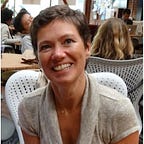Whole Systems Economic Development: A Regenerative Approach
Article 1, Part 1
By Beatrice Ungard and Ben Haggard (with The Regenerative Economy Collaborative)
In this series of four articles, we explore several practical applications of regenerative theory to local or regional economic development. The first article offers a general description of the approach, along with some of its theoretical underpinnings. The second addresses a grassroots process, with informal leadership provided by community members. The third looks at a more formal planning process within a municipal system led by its governing body. The fourth looks at a process originating within the business community. These approaches are not mutually exclusive and should produce synergies when more than one is occurring simultaneously in a given community.
Lest the breadth of consideration that is described in these articles confuse readers, it is important to remember that, from a regenerative perspective, economies are an aspect or activity of a living whole. Regenerative economic development is always undertaken as a way of expressing the potential of a whole system of place by evolving its wealth-generating capacity. Development of an economy is integrally interwoven with the simultaneous development of infrastructure, human capacity, ecological and cultural health, etc. This seamlessness is characteristic of a regenerative approach.
Article One: A Developmental Approach to Regenerating Local Economies
Over the last decade, we (the authors of this article) and our colleagues have tested the application of regenerative thinking to economic development. Our companies, Soma Integral Consulting and Regenesis Group have dedicated themselves to the evolution of a regenerative approach in a variety of community and organizational development contexts. Separately and together, we have served as resources and educators, helping citizens learn new ways to develop their communities and economies.
One might wonder why a different approach is needed. In their article, The Regenerative Economic Shaper: A Framework for Architecting the Next Economy, Carol Sanford and Ben Haggard write:
For too long, economic theories and practices have contributed to a range of destructive outcomes, such as extreme wealth inequality, conflicts over resources, and degradation of the world’s ecosystems. A plethora of experiments and new theories have attempted to address these issues, loosely held within the rubric of the next economy… However, many worthy efforts to invent a new kind of economy are falling short of their transformational potential.
The issue derives from the thinking and worldviews that underlie how these initiatives are created and carried out. So long as one tries to change an economic system without challenging its organizing premises and beliefs, one remains locked into its existing patterns. To transform a system one must transform the mind that one brings to it, and this is the explicit purpose of a regenerative approach.
These observations are not simply theoretical; they are urgent. The COVID-19 pandemic has thrown into sharp relief the dysfunctions of existing economic systems. It has exacerbated the impacts of colonialism, structural racism, and policies designed to protect and advance the interests of wealthy individuals, families, and nations at the expense of the vast majority of people and living systems. The resulting hunger for profound change highlights the need to grow new capabilities in communities around the world — the capabilities needed to transform their economies, not just tweak them. Borrowing from the language of Carol Sanford, it’s not enough to arrest disorder. Humans need to learn how to regenerate life.
Helping communities make this shift is our aim, and in this series we look forward to sharing examples and stories, successes and failures, from our work in the field. However, to make sense of these stories and to be able to extract lessons and patterns that can be applied in other situations, readers may benefit from knowing some of the basic premises and frameworks that inform our process.
